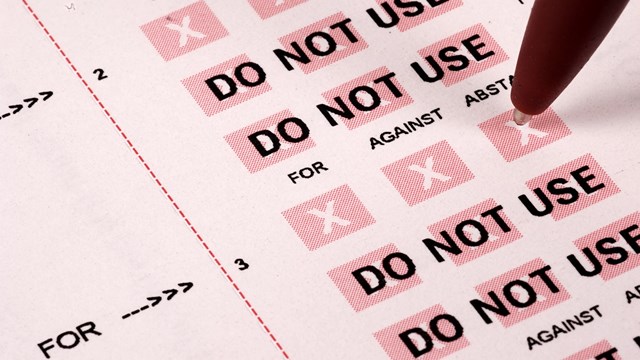Q. I am a shareholder and current member of the board of directors running for reelection in my co-op. At the meeting prior to the election, myself and the attorney for the co-op were engaged in a verbal dispute. The attorney became very angry with me, and said that he was told by someone he trusts that I called him a crook. The attorney indicated that he could sue me for slander. I told him that I can speak to other attorneys if I choose to. It ended with me asking him why he was taking this board issue with me so personally.
At the elections, we did not have a quorum and the other members decided to keep the elections open for a month. So the ballots were given to management to take with them back to the office to hold in case they received the additional ballots to reach a quorum. I am not comfortable with management handling the ballots without an independent outside person watching them. At this point, I feel the election has been tainted. At the end of the elections, I asked what was the process for challenging the elections in which nobody responded. Please help me if you can.
—Disgruntled Shareholder
A. Says Matthew Schwarz, an attorney at Geist Schwarz and Jellinek in White Plains: “Board of director elections are not allowed to be ‘held open,’ but the meeting for election can be adjourned to a later date where the election can take place even if quorum is not present (608 of the New York Business Corporation Law). To make sure elections are free from interference, it’s best practice to close voting for the election as soon as all votes have been cast and the ballots are in the hands of the appointed inspectors of election.
“An inspector of election or multiple inspectors are appointed to oversee the tally of the vote. Inspectors make sure elections run smoothly by receiving and counting the ballots, determining results, and addressing questions regarding the validity of the process. Inspectors are empowered to investigate questions, challenges, or any matter upon the request of any person present at the meeting or any shareholder entitled to vote (611 of the New York Business Corporation Law). If you are unhappy with the results of the election or if you think the election was not done properly, you can write a letter stating your objections to the inspectors of election to question the process. A formal challenge to the election would require you to commence an action in Supreme Court (619 of the New York Business Corporation Law).
“Typically, the election process is more detailed and tailored to your co-op in its bylaws, so my advice for you is to check your co-op’s bylaws as well for more information on the election process and how you can challenge the election, as well as the rules for ballot supervision.”










Comments
Leave a Comment